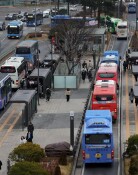Making the G20 a Permanent Body
Making the G20 a Permanent Body
Posted September. 30, 2010 07:42,
The Group of 20 Seoul summit set for November will be the first regular meeting of G20 countries. With the previous four meetings having promoted collaboration among the G20, the perception has grown that the G8 exists for global political affairs and G20 for the world economy. Under such favorable conditions, the heads of G20 economies agreed to hold the summit every year. The G20 summit initially began as a temporary meeting of the G8. Facing limits in overcoming the global financial crisis in 2008, the G8 asked for help from developing economies, leading to the creation of the G20 summit.
The G20 Seoul International Symposium was held Tuesday and Wednesday under joint hosting by The Dong-A Ilbo, the state-run Korea Development Institute and the U.S-based Brookings Institution. A variety of proposals for the G20`s future were made at the meeting. World-renowned experts said the G20 should shift its role from crisis management to the worlds top steering economic committee. This indicates that the G20 summit in Seoul should help expand the G20`s role and institutionalize the forum so that the promises made at the summit can be carried out smoothly.
At the symposium, former Canadian Prime Minister Paul Martin urged active participation of developing economies, saying the G20 is not the G7 plus 13 other countries. Pam Banha, vice president of Vietnam National Financial Research Institute, said, The G20 should reflect the interests of the 172 non-member countries. As a chair country, Korea is the only member promoted from developing to advanced status, and is thus in a position to control the interests between advanced and developing economies. This requires Koreas successful leadership.
The main agenda of the Seoul summit will be the G20`s future. Giving aid to developing countries is important but teaching them how to grow and develop themselves is more important. Homi Kharas, a senior fellow at Brookings, said the G20 should begin with concrete execution plans if it wants to differentiate itself from the G8. The November summit in Seoul will discuss the setup of a financial safety net, a move to help developing economies avoid currency crises like the one suffered by Asia in 1997.
The agreements made in the G20 summit do not have binding force, but the Seoul event will introduce mutual evaluations among member countries and have them report their implementation processes to international organizations. Committees supporting the implementation will also be created. This will ultimately raise the G20 summit`s effectiveness and naturally lead to discussion on institutionalizing the summit. Koreas contributions to the world and its global influence will also rise.







